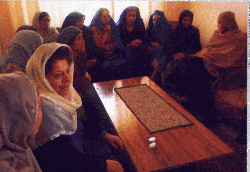| The veils came off last
Tuesday. Two hundred women had assembled outside the Kabul
apartment of Soraya Parlika, Afghanistan's most prominent woman
activist, and in one motion - they all lifted their
burkas. "It was a very emotional moment," says
Parlikar. "After years the women of Afghanistan came
out in the open. Under the Taliban we all wore burkas and
did not know each other. Now we all know each other's
faces."
Parlika, 57, headed the Afgan Red Crescent before the
mujahedin took over Kabul in 1992. She has emerged as the
leader of a small but growing underground women's
movement. She had initially planned on Tuesday to lead a
march of unveiled women to the U.N. compound in Kabul to demand
that women be included in any future government, but the police
told her they could not guarantee security - even in
post-Taliban Kabul.
Parlika is undeterred. "We intend to contact the
government," she says. "The demonstration was
the first move to get them to notice. We want women to
take part in every conference and every session of the new
government."
Since Tuesday, Parlika's apartment, on the third floor of a
bullet-scarred Soviet-style complex, has become a gathering
point for women from all over the city. They chat excitedly
about expanding opportunities for women in the new era and are
planning an even larger demonstration in the coming week.
But despite the symbolic baring of their faces at the
demonstration, most still arrive and leave wearing burkas.
"The burka is not the main problem of women," says
Parlika. "First women should find work and improve
their economic situation."
Parlika is use to challenging the status quo. She was
imprisoned and tortured in 1979 for organizing a women's
movement opposed to President Hafizullah Amin. During the
Taliban years she organized a network of secret schools for
girls in private apartments across the city.
"We were running hundreds of courses - English, Dari,
math, tailoring, computers, weaving, music. You would be
surprised at how many 11-year-old girls there are who can speak
perfect English," she says with a grin. Parents paid
about $1 a month for each course, and the students carried the
books for their classes hidden under their burkas
To be sure, the women gathering around Parlika represent
Kabul's well educated elite; many are teachers or doctors.
But already her activities have attracted the attention of the
U.N., which is urging the various Afghan factions to include
women in their delegations to the upcoming peace talks.
After five years of forced invisibility, Parlika knows she is
making some of the more conservative male leaders in Afghanistan
uneasy. But so much the better, she thinks. "I
just want to tell the world that women should be able to speak
out about their own problems." And she is determined
to make Afghanistan - and the world - listen.
by : Terry McCarthy/KABUL |

